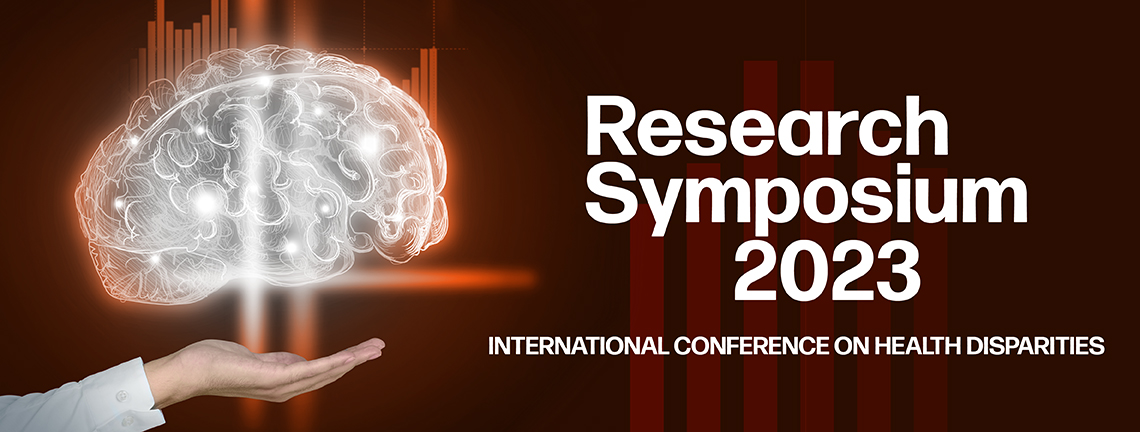
Posters
Presentation Type
Poster
Discipline Track
Community/Public Health
Abstract Type
Research/Clinical
Abstract
Background: Underrepresented groups are disproportionally affected by discrimination, which can have long-lasting influences on the individual’s wellbeing and mental health. This study leverages the diversity of the All of Us cohort to investigate the interplay between genetic risk factors and perceived discrimination in the context of mental health disorders. This study aims to shed light into the underlying biological and environmental risk factors, and its interplay, of mental health disorders in underrepresented populations.
Methods: Data on perceived discrimination was retreived from the the All of Us (AoU) COVID-19 Participant Experience (COPE) questionnaire and matched with sociodemographic and phenotypic data. Perceived discrimination was considered as a binary variable (has the individual experienced discrimination in the past or not) thus including various types/sources of discrimination (e.g., racial, age, gender, economic status, etc.). Two major mood disorders: anxiety and depression were considered, phenotypes for these disorders were defined for each individual based on prescription medication use. ANOVA, CHI2, and regression models were implemented using python to further delve into the underlying risk factors in the population of study. Linear regression models were also constructed using a calculated discrimination score.
Results: Preliminary results showed a total of 69,464 AoU participants who answered the discrimination questions within the COPE survey at any point. First survey responses for those participants were selected to be used for the data analysis. Medication use (anxiolytics and antidepressants) was assessed through participants medical records where 21,618 participants were prescribed one or more medications of the above two categories. The everyday discrimination score was constructed by summing the responses across all of the nine questions/ items assessing exposure, scores were then transformed to a mean item score by dividing the sum by number of completed items. Dose dependent associations reveal the impact of discrimination frequency on the individual’s wellbeing and mental health.
Conclusion: The study uncovers a different perspective about the biological and environmental risk factors of mental health disorders in underrepresented populations. Mobilization of more resources to address the mental health burden in underrepresented populations is warranted.
Academic/Professional Position
Faculty
Academic/Professional Position (Other)
Physician Assistant
Recommended Citation
Abdelbary, Bassent; Guerra Amorim, C. E.; Rodriguez, P.; and Montalvo-Ortiz, J. L., "Dissecting The Influence of Perceived Discrimination and Genetic Liability on Mental Health" (2024). Research Symposium. 109.
https://scholarworks.utrgv.edu/somrs/2023/posters/109
Included in
Dissecting The Influence of Perceived Discrimination and Genetic Liability on Mental Health
Background: Underrepresented groups are disproportionally affected by discrimination, which can have long-lasting influences on the individual’s wellbeing and mental health. This study leverages the diversity of the All of Us cohort to investigate the interplay between genetic risk factors and perceived discrimination in the context of mental health disorders. This study aims to shed light into the underlying biological and environmental risk factors, and its interplay, of mental health disorders in underrepresented populations.
Methods: Data on perceived discrimination was retreived from the the All of Us (AoU) COVID-19 Participant Experience (COPE) questionnaire and matched with sociodemographic and phenotypic data. Perceived discrimination was considered as a binary variable (has the individual experienced discrimination in the past or not) thus including various types/sources of discrimination (e.g., racial, age, gender, economic status, etc.). Two major mood disorders: anxiety and depression were considered, phenotypes for these disorders were defined for each individual based on prescription medication use. ANOVA, CHI2, and regression models were implemented using python to further delve into the underlying risk factors in the population of study. Linear regression models were also constructed using a calculated discrimination score.
Results: Preliminary results showed a total of 69,464 AoU participants who answered the discrimination questions within the COPE survey at any point. First survey responses for those participants were selected to be used for the data analysis. Medication use (anxiolytics and antidepressants) was assessed through participants medical records where 21,618 participants were prescribed one or more medications of the above two categories. The everyday discrimination score was constructed by summing the responses across all of the nine questions/ items assessing exposure, scores were then transformed to a mean item score by dividing the sum by number of completed items. Dose dependent associations reveal the impact of discrimination frequency on the individual’s wellbeing and mental health.
Conclusion: The study uncovers a different perspective about the biological and environmental risk factors of mental health disorders in underrepresented populations. Mobilization of more resources to address the mental health burden in underrepresented populations is warranted.

